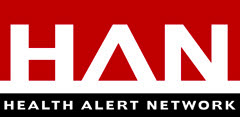
Thursday, March 27, 2003, 01:59 EST (1:59 AM EST)
CDCHAN-00130-03-03-27-ADV-N
Interim Domestic Guidance for Management of Exposures to Severe Acute Respiratory Syndrome (SARS) for Healthcare and Other Institutional Settings
Healthcare Settings
Several healthcare workers have been reported to develop Severe Acute Respiratory Syndrome (SARS) after caring for patients with SARS. Although the infectivity and etiology of SARS currently are unknown, transmission to healthcare workers appears to have occurred after close contact with symptomatic individuals (e.g., persons with fever or respiratory symptoms) before recommended infection control precautions for SARS were implemented (i.e., unprotected exposures). Personal protective equipment appropriate for standard, contact, and airborne precautions (e.g., hand hygiene, gown, gloves, and N95 respirator), in addition to eye protection, have been recommended for healthcare workers to prevent transmission of SARS in healthcare settings (http://www.cdc.gov/ncidod/sars/ic.htm). More general information on infection control in healthcare workers is available at http://www.cdc.gov/ncidod/hip/GUIDE/infectcont98.htm.
CDC, in collaboration with state and local health departments, is developing a systematic approach for surveillance of SARS exposures and infection in healthcare workers for use by healthcare facilities. Additional information on surveillance materials will be forthcoming. Given the currently available information on the epidemiology of SARS in the United States, the following outlines interim guidance for the management of exposures to SARS in a healthcare facility.
Exclusion from duty is recommended for a healthcare worker if fever or respiratory symptoms develop during the 10 days following an unprotected exposure to a SARS patient. Exclusion from duty should be continued for 10 days after the resolution of fever and respiratory symptoms. During this period, infected workers should avoid contact with persons both in the facility and in the community
(http://www.cdc.gov/ncidod/sars/infectioncontrol.htm).
Exclusion from duty is not recommended for an exposed healthcare worker if they do not have either fever or respiratory symptoms; however, the worker should report any unprotected exposure to SARS patients to the appropriate facility point of contact (e.g., infection control or occupational health) immediately.
Active surveillance for fever and respiratory symptoms (e.g., daily screening) should be conducted on healthcare workers with unprotected exposure, and the worker should be vigilant for onset of illness. Workers with unprotected exposure developing such symptoms should not report for duty, but should stay home and report symptoms to the appropriate facility point of contact immediately. Recommendations for appropriate infection control for SARS patients in the home or residential setting are available at http://www.cdc.gov/ncidod/sars/infectioncontrol.htm.
Passive surveillance (e.g., review of occupational health or other sick leave records) should be conducted among all healthcare workers in a facility with a SARS patient, and all healthcare facility workers should be educated concerning the symptoms of SARS.
Close contacts (e.g., family members) of SARS patients are at risk for infection. Close contacts with either fever or respiratory symptoms should not be allowed to enter the healthcare facility as visitors and should be educated about this policy. A system for screening SARS close contacts who are visitors to the facility for fever or respiratory symptoms should be in place. Healthcare facilities should educate all visitors about use of infection control precautions when visiting SARS patients and their responsibility for adherence to them.
Other Institutional Settings
To date, all patients with SARS reported to CDC in the United States have been either persons with a history of foreign travel to countries with SARS transmission or close contacts (e.g., family members or healthcare workers) to other SARS cases. Transmission has not been reported at schools, other institutions, or public gatherings in the United States. However, these recommendations concerning management of exposed healthcare workers could be adapted and applied to other settings, including schools and other institutional settings, as deemed appropriate.
HAN Message Types
- Health Alert: Conveys the highest level of importance; warrants immediate action or attention. Example: HAN00001
- Health Advisory: Provides important information for a specific incident or situation; may not require immediate action. Example: HAN00316
- Health Update: Provides updated information regarding an incident or situation; unlikely to require immediate action. Example: HAN00309
- Info Service: Provides general information that is not necessarily considered to be of an emergent nature. Example: HAN00319
## This Message was distributed to State and Local Health Officers, Public Information Officers, Epidemiologists and HAN Coordinators as well as Clinician organizations ##
You have received this message based upon the information contained within our emergency notification database. If you have a different or additional e-mail or fax address that you would like us to use, please contact your State-based Health Alert Network program at your State or local health department.
- Content source: CDC Emergency Risk Communication Branch (ERCB), Division of Emergency Operations (DEO), Office of Public Health Preparedness and Response (OPHPR)
Get email updates
To receive email updates about this page, enter your email address:
Contact Us:
- Centers for Disease Control and Prevention
1600 Clifton Rd
Atlanta, GA 30333 - 800-CDC-INFO
(800-232-4636)
TTY: (888) 232-6348 - Contact CDC-INFO


